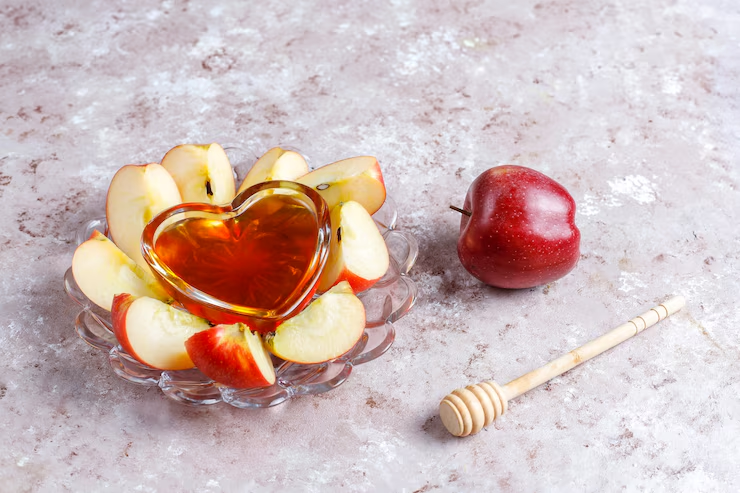Honey has been cherished for centuries as both a natural sweetener and a traditional remedy. Today, many people are curious about whether this golden liquid might also support heart health. With cardiovascular disease being one of the leading causes of death worldwide, even small dietary choices matter. So, is honey truly heart healthy—or is it just another source of sugar?
Unlike refined sugar, honey contains antioxidants, flavonoids, and trace minerals that may play a role in reducing oxidative stress and supporting blood vessel function. Some studies suggest moderate honey intake could help improve cholesterol levels, reduce inflammation, and even benefit blood pressure regulation. At the same time, honey is still a concentrated source of natural sugar and calories, meaning excessive consumption could work against cardiovascular health goals.
This guide explores the potential benefits and risks of honey for heart health, drawing from current medical evidence to help you understand how it fits into a balanced, heart-friendly diet.

How Does Diet Influence Heart Health?
Understanding the fundamentals of cardiovascular health is essential for making informed dietary choices. Three major factors that contribute to heart disease are high cholesterol levels, elevated blood pressure, and chronic inflammation.
When LDL (“bad”) cholesterol builds up in the arteries, it can lead to plaque formation and reduced blood flow, increasing the risk of heart attack and stroke. Similarly, high blood pressure strains the heart and blood vessels, while long-term inflammation can damage arterial walls and promote atherosclerosis.
A heart-healthy diet plays a crucial role in preventing and managing these risk factors. Diets rich in fruits, vegetables, whole grains, healthy fats, and lean proteins are associated with better cardiovascular outcomes. On the other hand, excessive intake of saturated fats, trans fats, and added sugars can contribute to weight gain, insulin resistance, and increased heart disease risk.
As people look for better alternatives to refined sugar, interest in natural sweeteners’ impact on heart health is growing. Honey, with its antioxidant content and lower glycemic index compared to white sugar, is often considered a more heart-friendly option.
However, not all natural sweeteners are created equal, and understanding their effects on blood pressure, cholesterol, and inflammation is vital for making smart dietary swaps. In the following sections, we’ll take a closer look at whether honey truly supports cardiovascular wellness—or if it should be used with caution like other forms of sugar.
What Is the Nutritional Profile of Honey and Its Effect on Heart Health?
Honey is more than just a natural sweetener; it’s a complex substance rich in nutrients and bioactive compounds that may contribute to cardiovascular wellness. Let’s explore how its composition and properties may influence heart health.
A. What Is Honey Made Of?
Honey is primarily composed of natural sugars—mainly fructose and glucose—but it also contains trace enzymes, amino acids, minerals, and antioxidant compounds. Unlike refined sugar, which offers empty calories, honey provides small amounts of beneficial nutrients.
Table: Nutritional Composition of 1 Tablespoon (21g) of Honey
| Nutrient | Amount |
| Calories | ~64 kcal |
| Total Sugars | ~17g |
| Fructose | ~8.6g |
| Glucose | ~7.5g |
| Protein | 0.1g |
| Potassium | ~11mg |
| Calcium | ~1mg |
| Magnesium | ~1mg |
| Antioxidants (polyphenols, flavonoids) | Varies by type |
The presence of trace minerals and bioactive compounds may make honey a better choice than sugar when consumed in moderation.
B. How Do Antioxidants in Honey Help the Heart?
Honey contains several powerful antioxidants, including flavonoids and phenolic acids, which can help reduce oxidative stress—a key factor in the development of heart disease. Oxidative stress damages blood vessels and promotes inflammation, which can accelerate atherosclerosis (plaque buildup in arteries).
Some studies suggest that darker varieties of honey (e.g., buckwheat honey) contain higher levels of antioxidants. These compounds help neutralize free radicals in the bloodstream, potentially lowering the risk of chronic inflammation and endothelial dysfunction—both precursors to cardiovascular issues.
In essence, honey’s antioxidant content may contribute to the body’s natural defense against inflammation and heart disease.
C. Can Honey Improve Cholesterol and Blood Pressure?
Emerging research has examined honey’s influence on lipid profiles and blood pressure, with promising, though not definitive, results.
- A 2013 study published in the Journal of Medicinal Food found that regular consumption of honey led to a reduction in LDL (“bad”) cholesterol and triglycerides, while increasing HDL (“good”) cholesterol in healthy individuals.
- Other studies have shown honey may have a mild hypotensive effect, potentially helping reduce blood pressure levels in people with hypertension.
However, results vary depending on the amount, type of honey, and duration of intake. While these findings are encouraging, more high-quality, long-term clinical trials are needed to draw firm conclusions about honey’s direct cardiovascular benefits.
D. How Does Honey Compare to Refined Sugar?
Refined sugar provides calories but no additional nutrients or health benefits. It also causes rapid spikes in blood glucose and insulin levels, which can contribute to weight gain, insulin resistance, and increased heart disease risk over time.
In contrast:
- Honey has a lower glycemic index (GI) than white sugar, meaning it raises blood sugar more slowly.
- It contains antioxidants and trace minerals that sugar lacks.
- Honey’s unique composition may promote better lipid metabolism when used in moderation.
That said, honey is still a sugar and should be consumed mindfully, especially for people managing blood sugar or weight.
| Feature | Honey | Refined Sugar |
| Glycemic Index | ~45–64 (varies by type) | ~65 |
| Nutrient Content | Trace vitamins & minerals | None |
| Antioxidants | Present (polyphenols) | None |
| Metabolic Effect | Slower glucose absorption | Rapid glucose spike |
| Flavor Intensity | Higher (used in smaller qty) | Mild (requires more) |
E. What Are the Risks of Consuming Too Much Honey?
Despite its benefits, honey is still calorically dense and high in natural sugars. One tablespoon contains roughly 64 calories and 17g of sugar, which can add up quickly if consumed in excess.
Potential concerns include:
- High glycemic load when eaten in large amounts
- Blood sugar spikes for individuals with diabetes or insulin resistance
- Weight gain if used frequently without adjusting overall calorie intake
The American Heart Association recommends limiting added sugar intake to:
- Men: no more than 36 grams per day
- Women: no more than 25 grams per day
Keeping honey consumption within this limit helps ensure you’re gaining benefits without increasing health risks.
How Can You Use Honey in a Heart-Healthy Way?
While honey offers potential heart-health benefits, moderation is key. Since it’s still a form of sugar, it’s important to keep daily intake within recommended limits.
The American Heart Association advises no more than 36 grams (about 2 tablespoons) per day for men and 25 grams (about 1.5 tablespoons) for women from added sugars—including honey.

For those aiming to protect heart health, using no more than 1 tablespoon per day is a safe and mindful target.
To incorporate honey into a balanced, heart-healthy diet, use it as a natural sweetener in place of refined sugar. For example:
- Drizzle a small amount on oatmeal or whole-grain toast.
- Stir into green tea or warm lemon water instead of sugary drinks.
- Use in homemade salad dressings or marinades with olive oil and vinegar.
When choosing honey, opt for raw or unprocessed varieties. Raw honey retains more of its natural antioxidants, enzymes, and phytonutrients that may support cardiovascular health. Local, organic honey is also less likely to be filtered or heat-processed, preserving its full nutritional value.
Ultimately, using honey sparingly and strategically can add flavor and potential heart benefits to your diet—especially when combined with a variety of whole foods, fiber-rich ingredients, and healthy fats. Always consider the bigger dietary picture, and think of honey as a natural complement, not a cure.
FAQs
Can honey lower cholesterol?
Some studies suggest that honey may help lower LDL (“bad”) cholesterol and raise HDL (“good”) cholesterol when used in moderation. Its antioxidant and anti-inflammatory compounds could play a role in improving lipid profiles. However, honey is not a replacement for cholesterol-lowering medications or lifestyle changes—it’s best used as part of a heart-healthy diet.
Is honey better than sugar for people with heart disease?
Yes, honey may be a better option than refined sugar for people with heart disease due to its lower glycemic index and antioxidant content. It causes slower blood sugar spikes and offers small amounts of nutrients. Still, it’s important to limit intake, as excess honey can contribute to high blood sugar, weight gain, and inflammation.
How much honey is safe to consume daily?
For most adults, limiting honey to 1 tablespoon (about 21 grams) per day is generally safe and aligns with heart-healthy guidelines. This keeps added sugar intake within recommended limits while allowing room for other nutrients in the diet. Always account for honey as part of your total daily sugar consumption—especially if managing weight or blood sugar.
Does honey affect blood pressure?
Preliminary studies show that honey may help lower blood pressure slightly due to its antioxidant and anti-inflammatory properties. These effects may support healthier blood vessel function. However, results are not yet conclusive, and honey should not be considered a treatment for high blood pressure. Maintaining an overall balanced, low-sodium diet remains essential.
Can honey help with inflammation?
Yes, honey contains natural antioxidants and bioactive compounds like flavonoids and phenolic acids that may reduce inflammation. Chronic inflammation is a known contributor to heart disease, and honey’s anti-inflammatory effects may support vascular health. Choosing raw, unprocessed honey maximizes these benefits—but it should be used in moderation, not as a cure-all.
Final Thoughts
Honey offers more than just sweetness—it contains antioxidants, trace nutrients, and potential heart-health benefits that make it a better choice than refined sugar when used responsibly. Research suggests honey may help reduce LDL cholesterol, support healthy blood pressure, and combat inflammation, all of which are important for cardiovascular wellness.
However, honey is still a form of sugar and should be consumed in moderation. Excessive intake can lead to weight gain, blood sugar spikes, and other risk factors associated with heart disease. Choosing raw or unprocessed honey and limiting your daily intake to about one tablespoon can help you enjoy its benefits without compromising your health goals.
So, is honey heart healthy? When used thoughtfully, it can be a smart addition to a heart-conscious diet. Pair it with whole foods, lean proteins, and healthy fats, and it becomes part of a balanced approach to nutrition that supports overall cardiovascular health.


